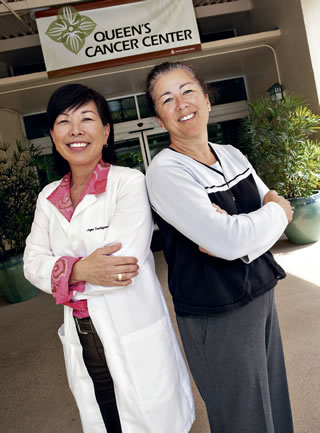Komen For Cancer Care
Jayne Tsuchiyama And Lorrieann Santos
The Queen’s Medical Center
What is your position at Queen’s?
Tsuchiyama: I am an acupuncturist at Queen’s, providing services to patients of the Queen’s Cancer Center and Women’s Health Center. I am a licensed acupuncturist, and I’m board certified in oriental medicine, which encompasses acupuncture, herbology and medical massage. I did my training in several hospitals in New York, and I am certified in acupuncture for the cancer patient by Memorial Sloan Kettering, one of the top cancer institutions in the world. I launched the acupuncture program at the Queen’s Cancer Center in 2008 and in 2011 at the Queen’s Women’s Health Center.
Jayne Tsuchiyama and LorrieAnn Santos
Santos: I am a patient resource advocate and tobacco treatment specialist at the Queen’s Cancer Center.
You were both awarded Susan G. Komen grants last year. What are those grants being used for?
Tsuchiyama: Cancer treatment typically involves powerful drugs and/or surgery. These therapies almost always have side effects nausea, dry mouth, headaches, anxiety, pain, neuropathies and more. Acupuncture has been used to help with many of these side effects. In Hawaii, acupuncture is generally not covered by insurance. The Komen grant allows me to provide acupuncture treatments to low-income, uninsured patients at no cost to them.
Santos: The Queen’s Medical Center received the Komen grant, Kokua Kahiau, in 2011. The title means “to help someone without any expectation of reciprocity.” It targets Komen-identified priority populations, which are Native Hawaiians, Filipinos, Pacific Islanders and rural residents. We consider a rural resident to be from a Neighbor Island or rural Oahu. Another priority group is made up of patients who have unmet cancerrelated treatment needs not covered by medical insurance, acupuncture being one of them. To date, more than 20 patients have benefited from this grant.
Are the two grants related?
Santos: While not related, both complement the cancer care and treatment patients receive at the Queen’s Cancer Center. The Kokua Kahiau grant is subsidy based, where women can get up to $200 in financial assistance on a reimbursement basis. We reimburse them based on receipts they provide us for any cancer-related treatment costs. If they’re ineligible for acupuncture through Jayne’s Komen grant, they can be covered through this one.
Tsuchiyama: My grant covers the actual cost of acupuncture treatment. LorrieAnn’s grant can cover other expenses such as transportation to one’s chemotherapy appointment. We work closely together. She screens atients who might be of need but not aware of the acupuncture program.
In what ways does acupuncture help?
Tsuchiyama: The World Health Organization, the American Cancer Society and the National Institutes for Health, among many other highly respected institutions, all recognize the effectiveness of acupuncture in treating a variety of conditions. For patients undergoing cancer therapies, we have effectively used acupuncture to treat fatigue, insomnia, shortness of breath, pain, headache, numbness and tingling in the hands and feet, depression, hot flashes, dry mouth and more.
Since we launched the acupuncture program in 2008, I have given well over 1,500 treatments. Of those, more than 250 have been administered to breast cancer patients paid for by the Komen grant. Breast cancer patients in particular frequently develop painful neuropathies in their fingers and hands during or after chemotherapy treatment. These neuropathies respond very well to acupuncture. There’s not much in the way of Western medicine that helps with that condition.
What if people are afraid of needles?
Tsuchiyama: People being treated for cancer have to endure a lot, including getting poked to draw their blood. No wonder they get needle-phobic! But acupuncture needles are tiny. You can fit 40 acupuncture needles in the head of your average hypodermic needle the kind used for blood draws. Often, when I am inserting the needles patients don’t feel anything. I don’t just go up to a patient and start inserting. First we discuss symptoms and progress from the last session. This helps patients relax. I’ll sometimes work with a patient’s breathing, which also helps them to relax. Also, I treat children and teens in my private practice so I’ve developed techniques for coping with people who are afraid of needles. Patients lie down on a heated bed, with a light mylar blanket covering them and listen to music. So they typically unwind very quickly. In fact, many fall asleep.
Anything you want to add about your grant?
Santos: Although I see patients of all cancer types, the Komen Kokua Kahiau grant is specific to breast cancer patients. A lot of times, especially with the three priority populations – Native Hawaiians, Filipinos and Pacific Islanders they come in with little or no insurance. In many cases, patients and their families have no idea how much cancer costs. There are hospital costs, private provider costs the anesthesiologist, the radiologist -and then you have medication costs. So they’re overwhelmed and there aren’t any resources they can tap into. The grant gives them $200. As part of the program they’re also entitled to receive five $10 meal tickets to use at any of the Queen’s food outlets. This is very helpful to a patient receiving daily treatment, especially if they are not eligible for public assistance.
Tsuchiyama: We are always looking to help breast cancer patients in need and you don’t have to be a Queen’s patient to qualify. (Breast cancer patients or survivors who meet the grant qualifications unemployed, uninsured, food stamp recipient or lowincome housing can contact Tsuchiyama at 5458777 or jtsuchiyama@queens.org, or you can get more information at imoahu.com.)
I am extremely grateful for the generosity of the Komen Foundation-Hawaii affiliate. There’s a Susan Komen race each October. Another cancer foundation has a race in October, but most of the funds they raise typically are forwarded to their national headquarters, whereas 75 percent of the funds we raise stay here to support local causes. The Hawaii Susan G. Komen affiliate also has a new fundraiser this year, the Pink Tie Ball (March 9 at the Royal Hawaiian hotel).







